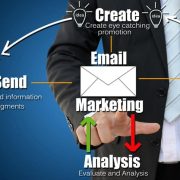The demand for marketers at all levels continues to grow, with an annual growth rate of 19%. If you look at the functions, 56% of companies are looking for marketers with digital skills. Creative services are third at 35%.
Marketers in all industries are changing as the demands and needs of their customers change. For many professionals, the solution is to upskill themselves constantly. This is especially true for those with an eye on the executive boardroom.
Marketing professionals are good at climbing the ranks of C-suite. According to a University of Notre Dame research, companies with a CEO from a CMO role outperformed others by 15%.
It is easy to see why executives with a marketing background would find it an asset. This article explores the path from assistant to C suite and how educators participate in this progression.
Marketing Assistant
Skills required: Digital marketing, social media, email, event management
This is a typical entry-level position in a career in marketing. This role is usually responsible for providing administrative support to the marketing department. It may also include assisting in data collection and analysis or organizing events.
As so much of marketing is now done online, marketing assistants should know about digital marketing, such as email or SEO, and understand social media channels well.
Research suggests that having good customer service skills can add 4% more to the expected salary.
Education institutions can offer digital skills as part of a degree program or a program for continuous professional development. Graduates who have a solid foundation in digital marketing, and are introduced to specialisms like mobile and email marketing, will be able to secure a position as a Marketing Assistant and refine their skills as they apply them. Apprenticeships can also be a great way to gain experience and guarantee an entry-level job.
Marketing Executive
Required skills: analytics, social media, paid media (including the display and video advertising), basic SEO, website optimization
The Marketing Executive role requires a deeper understanding of digital, including social media, paid advertising, SEO, and optimization. It would also be advantageous to have some prior experience working in marketing departments, for example, as a Marketing Assistant.
It is essential to be familiar with social media analytics and to have a good understanding of organic and paid campaigns to interact with customers. A Marketing Executive must be able to track conversion rates and also play a part in lead generation.
This level requires a thorough understanding of all marketing activities, from video advertising to paid media—specialized training in social media, strategy and planning, and other areas. The educator can assist the transition from assistants to executives by offering upskilling programs that can easily be applied in a daily role.
Marketing Specialist
Required skills: Advanced analytics, SEO, paid media and strategy, ecommerce, and email
As you move up the ladder of career advancement, you will need to have more advanced skills, such as SEO and ecommerce. Working closely with sales to develop personas and ensure the CRM meets business objectives is essential.
A specialist’s role also requires a new understanding of strategy, as aligning marketing and sales goals with business objectives is essential. It is vital to have a bird’s-eye view of the business to identify opportunities and create successful campaigns that generate leads or transactions.
To help educators in this role, they must provide specialized education in areas like social media and strategy and planning. A niche training program will reinforce digital media knowledge and dive into key areas that set marketing specialists apart and help them progress.
Marketing Manager
Required skills: Management, digital innovation, leadership, strategy, and planning
Marketing managers are responsible for marketing and strategic planning of products, brands, or product lines. They also analyze performance. You must have at least leadership and management skills to be considered for a managerial-level position.
Potential marketing managers could gain an edge over competitors by demonstrating digital innovation skills and a keen eye for emerging marketing channels. Strong communication skills are necessary for Marketing Managers responsible for implementing marketing plans and coordinating input from creative, research, and sales teams. Marketing managers with strategic marketing skills can earn as much as 9% higher than the national average.
A marketer’s career is at a stage where ROI, planning, and strategy are essential skills. A postgraduate qualification can help refine skills to improve growth, with communication and consumers as the focus. Teachers who can deliver learning programs that meet these needs will be able to corner the market full of motivated, ambitious professionals.
Head of Marketing
Required skills: Management, strategy and planning, digital innovation, business innovations, branding, campaigns, and performance monitoring
As the role of Head of Marketing moves closer to the C suite, it requires leadership, management, and digital innovation skills. Both managing marketing campaigns and people requires performance monitoring skills. A thorough understanding of business innovation, branding, and PR is also needed.
The head of marketing is responsible for the management of marketing budgets, the creation of campaigns, and monitoring of the performance of marketing projects. This role requires excellent communication skills since it involves dealing with internal and external stakeholders, such as clients, vendors, and department heads. This role requires a marketer to work closely with the CMO and other members of the C-Suite to achieve ROI and KPIs.
This level will require an education program that builds on experience and knowledge. This requires a Masters-level qualification, which will provide an advanced understanding of critical concepts underpinning digital marketing and digital and social sales. Understanding how to influence and interact with consumers online can help align departments and improve outcomes.




















Comments